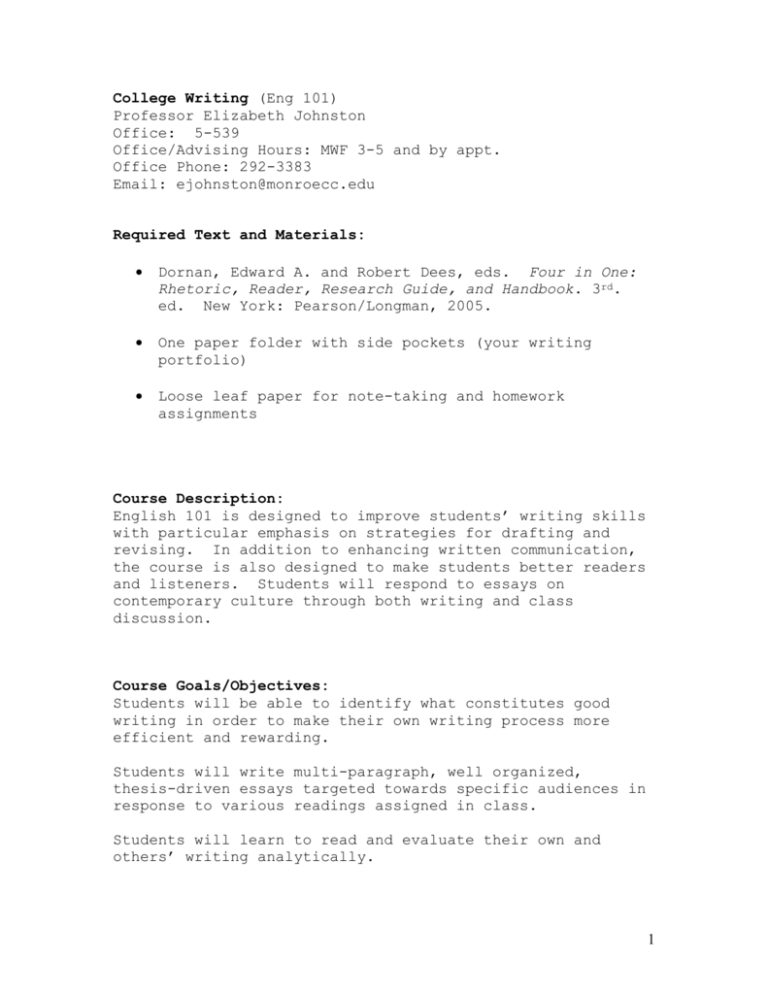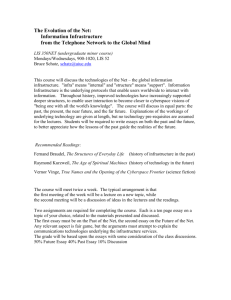
College Writing (Eng 101)
Professor Elizabeth Johnston
Office: 5-539
Office/Advising Hours: MWF 3-5 and by appt.
Office Phone: 292-3383
Email: ejohnston@monroecc.edu
Required Text and Materials:
Dornan, Edward A. and Robert Dees, eds. Four in One:
Rhetoric, Reader, Research Guide, and Handbook. 3rd.
ed. New York: Pearson/Longman, 2005.
One paper folder with side pockets (your writing
portfolio)
Loose leaf paper for note-taking and homework
assignments
Course Description:
English 101 is designed to improve students’ writing skills
with particular emphasis on strategies for drafting and
revising. In addition to enhancing written communication,
the course is also designed to make students better readers
and listeners. Students will respond to essays on
contemporary culture through both writing and class
discussion.
Course Goals/Objectives:
Students will be able to identify what constitutes good
writing in order to make their own writing process more
efficient and rewarding.
Students will write multi-paragraph, well organized,
thesis-driven essays targeted towards specific audiences in
response to various readings assigned in class.
Students will learn to read and evaluate their own and
others’ writing analytically.
1
CLASS RULES:
Attendance:
Attendance is MANDATORY. I reserve the right to withdraw
you from the class after your 5th absence.
Tardiness:
Coming late to class is inconsiderate to both your
classmates and me. I will shut the door when class begins;
please do not come in if the door is shut.
Preparation:
Please come to class prepared to discuss the assigned
readings and/or with your complete assigned drafts.
Students who come to class without required work will be
asked to leave and will be counted absent.
Late Work:
Work will not be accepted after the day it is due. If you
think you will miss a class, please make arrangements with
me to turn your work in early.
Withdrawal Policy:
May 7 is the last day to withdraw from the course with a
grade of “W.” I will not withdraw you from class if you
simply stop coming. Note: Withdrawal may impact your
eligibility for financial aid.
Email:
All students taking this class have access to an email
account through MCC. You need to check your email
periodically for announcements I may send to the class.
I encourage you to email me with questions about
assignments or concerns you have about the class.
DO NOT SEND WORK TO ME VIA EMAIL.
Cell Phones/Beepers:
Please turn off or set electronic devices to buzz upon
entering the classroom; you will be asked to leave, and
counted absent, if your cell phone rings or your beeper
goes off during the class period.
2
Learning Centers: Monroe Community College has a number of
Learning Centers at Brighton (for example, Accounting,
Math, Psychology, Writing, the Electronic Learning Center,
etc.) and at Damon (for example, the Integrated Learning
Center, Electronic Learning Center, etc.). Learning
centers are staffed with instructional personnel and may be
equipped with computers and software to assist students.
It is recommended that students use the Learning Centers to
get additional help with concepts learned in the classrooms
and with their homework. Please complete Part A of the
Learning Center Referral form attached to this Course
Information Sheet and return the form to your instructor.
Emergency Closings: If the college is closed due to
inclement weather or some other emergency, all Rochester
area radio and television stations will be notified no
later than 5:30 a.m. In addition, the homepage on the MCC
website (www.monroecc.edu) will display a message
indicating the College is closed. Please do not call the
College to avoid overloading the telephone lines.
Class cancellation information is available daily on the
web or through the telephone. Simply go to the MCC website
(www.monroecc.edu/go/dailycancellations). Additionally,
class cancellation information is available by dialing 2922066, press “1” for the Brighton Campus and “2” for the
Damon Campus. If possible, please use the web as there
could be delays in the voice recordings based on the number
of cancellations.
Plagiarism:
Any student caught plagiarizing any part of any assignment
will receive no credit for the assignment in question and I
reserve the right to initiate proper university
disciplinary action, including failure of the course.
Disability Statement: MCC recognizes the importance of
encouraging and helping students with disabilities reach
their full potential. If you possess a documented physical
or learning disability please speak to me after class so
that we can make the appropriate accommodations.
**YOUR ATTENDANCE ON THE SECOND DAY OF CLASS IMPLIES THAT
YOU HAVE READ, UNDERSTAND AND ACCEPT THE CONDITIONS OF YOUR
PARTICIPATION IN THIS CLASS.
3
Evaluation/Grading
Essays (250 pts):
Personal Narrative, 4 pages
Definitional Essay, 4 pages
Research Paper, 5-6 pages in length, 5 documented
sources
Writing Portfolio (point value calculated into essay grade)
Each graded essay requires a drafting process; all
drafts created to produce your final version will be
turned in your writing portfolio each time you submit
an essay for a grade. Each drafting process will
consist of three drafts and a final version, all of
which will be turned in with your writing folder as
part of the final version of each assignment.
Any
additional in-class work as part of the drafting
process will also be included with the final essay.
Each time a portfolio is due, you will receive a
checklist to make sure you have all the required
components in your folder before you turn it in.
Because learning how to successfully revise your
writing is an important component of the writing
process, failure to complete any of these drafts and
in-class assignments will result in a lowered essay
grade—each missing draft will drop your essay grade
the equivalent of 1/2 letter grade.
Your syllabus indicates when a new component of the
drafting process is due. If you arrive to class
without the assignment, you will be sent home and
counted absent.
Homework (50 pts):
To prepare you to write convincing arguments, you will be
reading essays in your book similar to the essays you will
be writing. For each reading, you will be asked to
complete an informal homework assignment. There are a
total of ten of these (graded on a scale of 1-5 points
each).
These may be handwritten, and should range from 1-2 pages
each. You will turn these in at the beginning of the class
period.
4
These informal writing assignments do not need to be
included in your writing portfolio.
Participation (50 pts): Participation in class discussion
and peer response workshops is an important part of
becoming a better writer and reader. Thus, each student is
expected to contribute daily to discussions of readings and
workshops. Simple attendance is NOT considered
participation!
Students will also participate in peer responses during
essay workshop days; the quality of your responses will be
factored into your participation grade.
Emailing me and coming to see me also count as
participation.
Oral Presentation (50 pts): At the end of the semester
students will be writing a research paper. Each student is
expected to present a five to seven minute overview of
their research topic and argument. Visuals will be
required. You will be scheduled for one of these
presentations and receive a detailed assignment sheet as
the presentation dates approach.
Your total grade for the class will be calculated as
follows:
Essay 1—Personal Narrative: 75 points
Essay 2—Definitional Essay: 100 points
Essay 3—Research Essay: 125 points
Homework: 50 points
Participation: 50 points
Oral Presentation: 50 points
Total: 400 pts.
Your grade for each assignment can be calculated by
dividing the points earned by the total points the
assignment is worth. For example, if you get 45/50 points
on the first essay, your grade is a .90, or 90%--an A-.
Your grade for the class can be determined the same way.
360/400 points is a 90%, an A-.
5
Schedule of Classes
Unit 1: Personal Narrative
Jan 24
First Day of Class; Introductions and review of
syllabus
Jan 26
In-class Workshop
Jan 28
Read Ch.4; Due: #2, p.43
Jan 31
Read Denfield, “The Lady of the Ring,” pp 485—86;
DUE: “Recording Reflections” and “Activities for
Rereading,” pp. 486-87.
Feb 2
Read Staples, “Black Men and Public Space,” pp.
570-72; DUE: “Recording Reflections” and
“Activities for Rereading,” p. 572.
Feb 4
Read Tan, “Mother Tongue,” pp.573-78; DUE:
“Recording Reflections” and “Activities for
Rereading,” p. 578.
Feb 7
In-class Workshop
Feb 9
Read pages 52-58; DUE: a purpose statement and
informal plan for prompt given in class on
Friday.
Feb 11
Read Ch.6; DUE: #2, p. 76
Feb 14
Read pp. 79-82; Due: draft of intro to class
Feb 16
Read pp. 82-95; Due: 3 topic sentences to class
Feb 18
Read pp. 95-98; Due: full 3 page, typed draft to
class
Winter Recess
6
Feb 28
Due: Draft 2 Due (typed; based on workshop
revisions)
Mar 2
No Regular Class—Conferences in my office (DUE:
Draft 3)
Mar 4
No Regular Class—Conferences in my office (DUE:
Draft 3)
Mar 7
DUE FOR GRADE (75 PTS): Essay 1, Final Version
and Writing Portfolio
Mar 9
In-class Workshop
Mar 11
Read Guilbault, “Americanization is Tough on
‘Macho,’” pp. 506-08; DUE: “Recording
Reflections” and “Activities for Rereading” p.
508
Mar 14
Read Winn, “TV Addiction,” pp.583-84; Due:
“Recording Reflections” and “Activities for
Rereading” pp. 584-85
Mar 16
Read Handout; DUE: questions from handout
Mar 18
In-class Workshop
Mar 21
Read Ch 18
Mar 23
DUE: Outline
Mar 25
DUE: draft 1, Essay 2 due (typed, 4 pages)
Mar 28
Read pp. 118-28 (#s 1-8); DUE: revise your draft
using these suggestions and highlight changes on
Draft 2, due in class
Mar 30
Read pp. 128-38 (#s 9-15); DUE: revise your draft
AGAIN using these suggestions and highlight new
changes on Draft 3, due in class
7
Apr 1
Conferences; No regular class scheduled; DUE:
Draft 3
Apr 4
Conferences; No regular class scheduled; DUE:
Draft 3
Apr 6
DUE: Final Version Essay 2 with Writing Portfolio
Apr 8
Read handout; DUE: questions on handout
Apr 11
Read Rose, “Proud to Be a Speciest,” pp. 560-63;
DUE: “Recording Reflections” and “Activities for
Rereading,” p. 563
Apr 13
Read Regan, “Animal Rights, Human Wrongs,” pp.
555-59; DUE: “Recording Reflections” and
“Activities for Rereading,” p.559
Apr 15
Read Ch. 19
Spring Break
Apr 25
Read pp. 299-311; Meet in Library
Apr 27
Read pp. 316-23; Meet in Library
Apr 29
Read pp. 346-42; in-class workshop
May 2
DUE: 4 articles/books to workshop
May 4
Read pp. 352-56; DUE: Draft 1 due (typed, 5
pages)
May 6
DUE: Draft 2 and works cited (both typed)
May 9
Oral Presentations
May 11
Oral Presentations
May 13
Oral Presentations
May 16
Oral Presentations
May 18
Oral Presentations
8
May 20
No Regular Class; Conferences in my office; DUE:
Draft 3 and works cited
Final Paper and Portfolio due during Exam Week/ TBA
9








